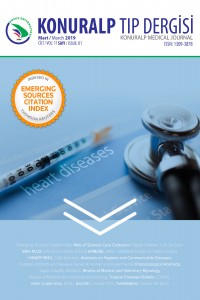Abstract
Objective: Angiogenesis
is physiological event which involve endothelial cells and in malignant
conditions involve bone-marrow derived cells, stromal cells related to tumor
microenvironment is a multifactorial event. The main factor in this event is
vascular endothelial growth factor (VEGFA). In recent years, bevacizumab
(anti-VEGF) agent has been used against VEGFA receptor to block potential
vascular signal in tumor cells and different activities were determined by in
vitro experiments in lung cancer (NSCLC), colorectal cancer, breast cancer and
renal cell carcinoma. The main objective of this study was to determine the
vascularity and mechanism of vascular cancer in Bevacizumab-treated lung cancer
cells compared to normal cells.
Material-method: Study
of cell functions with main stimulant VEGF and Bevacizumab applications which
provide angiogenesis blockade. Normal epithelial HUVEC line and lung cancer
A549 cell line were used and cultured according to ATCC protocol. After
application of different doses of agents, cell viability, Sytox proliferation index
and Notch pathway activity responsible for angiogenesis were investigated.
Results: Cells
treated with VEGF showed a significant increase in cell viability with
incubation for 24 hours. VEGF effect was significantly different in two cell
lines compared to viability. In the application of Bevacizumab, the proliferation
index of A549 cells decreased significantly and the ADAM10 protein level
associated with the Notch mechanism was found to increase significantly
compared to HUVEC cell.
Conclusion: According
to the findings, it is seen that it needs more detailed studies to explain the
molecular mechanism of angiogenesis. In
addition to conventional cancer treatment methods, enhancing combined therapies
with known antiangiogenic agents will increase the chances of success.
Keywords
References
- Reference 1: Assoc.Prof. Recep Eroz (Duzce University. Faculty of Med. Genetics Dep. eroz38r@hotmail.com
- Reference 2: Assoc.Prof. Serap Akcali Duru (Ankara Yildirim Beyazit hospital, Dep of Pulmonary Medicine. akcalis@hotmail.com
Abstract
Amac: Anjiyogenez,
endotelyal hücreler, malign durumlardaki tümör hücrelerinin yanı sıra kemik
iliği kaynaklı hücreler ve stromal hücreleri içeren tumor mikrocevresindeki
hucreleri kapsayan çok faktörlü ve çok hücreli bir kompleks (pato-)fizyolojik
olaydır. Bu olayin ana faktoru, vasküler endotelyal büyüme faktörüdür (VEGFA).
Son yillarda tümör hücrelerinde potansiyel damarlanma sinyalini bloke etmek
icin VEGFA reseptorune karsi bevacizumab (anti-VEGF) ajani kullanilmaktadir ve akciğer
kanseri (NSCLC), kolorektal kanser, meme kanseri ve renal hücreli karsinomada
in vitro deneylerle farkli etkinlikleri belirlenmistir. Bu calismadaki temel
hedef, Bevacizumab uygulanmis akciger kanser hucrelerinde damarlanma etkinligi
ve mekanizmasinin normal hucrelerle karsilastirilarak belirlenmesidir.
Gerec ve yontemler:
Ana uyarici VEGF ve anjiyogenez blokajini saglayan Bevacizumab uygulamalari ile
hucre fonksiyonlari incelendi. Normal epithelial HUVEC hatti ile akciger kanser
A549 hucre hatti kullanildi ve ATCC protokolune gore kulture edildi. Farkli
dozlarda ajanlar uygulandiktan sonra, hucre canliligi, Sytox cogalma indeksi ve
anjiyogenezden sorumlu basamak Notch etkinligi arastirildi.
Bulgular: VEGF
ile muamele edilen hucrelerde 24 saat inkubasyon ile hucre canliliginda
belirgin artis saptandi. Iki hucre hattinda canlilik duzeyleri
karsilastirildiginda VEGF etkisinin anlamli derecede farkli oldugu goruldu. Bevacizumab uygulamasinda ise, A549
hucrelerinin cogalma indeksi anlamli derece azaldi ve Notch mekanizmasi ile iliskili
ADAM10 protein duzeyinin, HUVEC hucresine gore anlamli artis gosterdigi tespit
edildi.
Sonuc: Elde edilen bulgulara gore anjiyogenez molekuler
mekanizmasinin aciklanmasi adina daha detayli calismalara ihtiyac oldugu
gorulmektedir. Geleneksel kanser tedavi yontemleri yani sira etkisi bilinen
antianjiyogenik ajanlarla kombine tedavilerin arttirilmasi basari sansini
arttiracaktir
Keywords
References
- Reference 1: Assoc.Prof. Recep Eroz (Duzce University. Faculty of Med. Genetics Dep. eroz38r@hotmail.com
- Reference 2: Assoc.Prof. Serap Akcali Duru (Ankara Yildirim Beyazit hospital, Dep of Pulmonary Medicine. akcalis@hotmail.com
Details
| Primary Language | Turkish |
|---|---|
| Subjects | Health Care Administration |
| Journal Section | Articles |
| Authors | |
| Publication Date | March 25, 2019 |
| Acceptance Date | February 3, 2019 |
| Published in Issue | Year 2019 Volume: 11 Issue: 1 |


